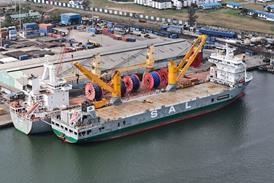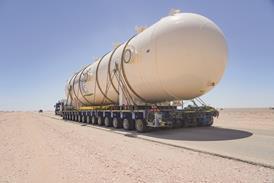Lucius Bunk, director at shipowner Auerbach Schifffahrt, discussed the current and potential impacts of the Covid-19 crisis on multipurpose shipping, along with the group's plans for the years ahead.

The last three years have been positive for Hamburg-headquartered Auerbach Schifffahrt and it now manages 15 multipurpose ships - the most recent of which was delivered at the end of March 2020.
Auerbach accepted delivery of the vessel in Masan, South Korea, and shortly afterward, the government imposed quarantine restrictions that made crew changes impossible. "It was a very dynamic processes. We sent a couple of our colleagues to be present when we took over the ship and it did work well," said Bunk.
Established nine-and-a-half years ago, Auerbach continues to focus exclusively on the niche multipurpose shipping sector.
"When we started the company we expected the cycle to turn in our favour earlier than it did," said Bunk, who noted that multipurpose rates continued to deteriorate until mid-2017, before slowly picking up. At that time, Auerbach managed a fleet of six vessels.
"We bought a vessel in May 2017 at a really good price, at a great time, and we felt that was a good start to buy in again and to grow the business. We have continued to do this for the past three years.
"We stuck to our principles and decided to only go for 'buy and hold' strategies. We made conservative purchases, and did not follow the sort of 'asset play' idea based on the belief in a quick market recovery. We felt that asset prices were low enough to buy and to operate for a few years at a reasonable cost." The strategy has proven to be successful.
Today, Auerbach owns nine of the 15 vessels in its fleet and acts as third-party manager for the remainder.
Current situation
Clearly, given the outbreak of Covid-19, markets can change in a heartbeat. Bunk suggested that the market for multipurpose shipping services has remained fairly stable, and vessels are still transporting cargo across the globe - although the situation continues to change and needs to be reassessed on a daily basis.
"There were some issues in Asia during the first quarter when Covid-19 first appeared, with ports temporarily closed, quarantine measures put in place, and some cargo was delayed.
"Now, that is a fear in Europe and the USA and the latest developments indicate that similar dynamics will play out. But, Asia is returning to the market and is really picking up. All the operators that we speak with confirm that there is quite a lot of cargo available out there. It is a mixed picture right now," said Bunk.
Some larger clients have decided to shut down businesses for a couple of weeks to analyse their supply chains, and to avoid the risk of having cargo aboard a vessel that could not be delivered, added Bunk, but the overall impact has been somewhat limited thus far.
"There have been some shocks to the supply chain that certainly affects our niche industry but there have not been any serious effects so far. I would expect the latter half of Q2 to be a bit more bumpy."
Covid-19 has had a devastating effect on multiple markets, such as aviation, hospitality and tourism. Shipping, while not immune, has been shielded somewhat from the turmoil.
"Vessels are still needed. Yes, rates may take a dip for little while but I am optimistic and looking forward I still think the fundamentals are there. There will be massive demand for infrastructure [when the crisis subsides]. I think that, globally, leaders will try to reignite their economies by putting cash into large infrastructure projects."
Right now it is difficult to predict with any great accuracy as to when the coronavirus crisis will be brought under control, and what the market could look like, but there will be marked recovery in many sectors, said Bunk.
"I do not see a massive storm approaching because a lot of the business we have is long term. Infrastructure investment is certainly going to be a massive driver going forwards, but wind energy has been constant and will continue to be so."
Addressing climate change is of increasing importance to countries around the world and the project logistics opportunities associated with that industry are unlikely to disappear. "I think this business will get stronger when we return to normal business mode," he added.
"The only danger I see is in the oil and gas sector, with oil prices this low. That sector obviously brings a lot of valuable cargo to our industry and we will see some projects being sidelined and temporarily put on hold."
Other issues, Bunk considered, are sociological. Of course, the world wants to get back to 'normal' as soon as possible. The timescale for this is unknown – moving prematurely risks further outbreaks of Covid-19; extended draconian measures risks damaging economies unnecessarily and creating social unrest. Both have the potential to affect the movement of heavy and oversize cargoes.
Another major challenge arising out of the coronavirus outbreak has been crew changes.
Bunk said that these regulations, which are being implemented in countries worldwide, are posing difficulties and mean that crews need to stay onboard for longer. "That certainly is hard for our colleagues on board the vessels.... we are trying, of course, to get them changed when we can."
Looking ahead, "scheduled dry-docks need to be reassessed. China has reopened but this may change. Other countries where you have booked your slot might not be available. There are certainly some issues there," said Bunk.
With an eye to the future, Bunk stated that Auerbach wants to be at the forefront of the industry's technical development by fostering and developing talent and ideas.
"We started the process last year, when we were thinking about what to do in the next decades. We are quite happy with the fleet growth and feel that we have a good baseline to build on. But there are 'mega trends' out there that the shipping industry has not properly addressed so far.
"We do not want to wait to be replaced or become obsolete. We would like to take an active role in the digitalisation of logistics and the supply chain. A lot has happened already in aviation, on the road and at shore, but the maritime industry has been a bit slow to adapt.
"The ecosystem of start-ups has improved over the last 12-24 months but it is still early stages. We feel that we can contribute and support young entrepreneurs that see opportunities within this sector. Rather than waiting for them to knock on the door, we want to incubate and provide ideas ourselves, and find the right people to build these ventures.
"We have teamed up with a couple of entrepreneurs from Berlin, which is the hotspot in Germany for digital business. And irrespective of further developments related to Covid-19 we are going to launch this in Q2." More details will be made available in the coming months.
















